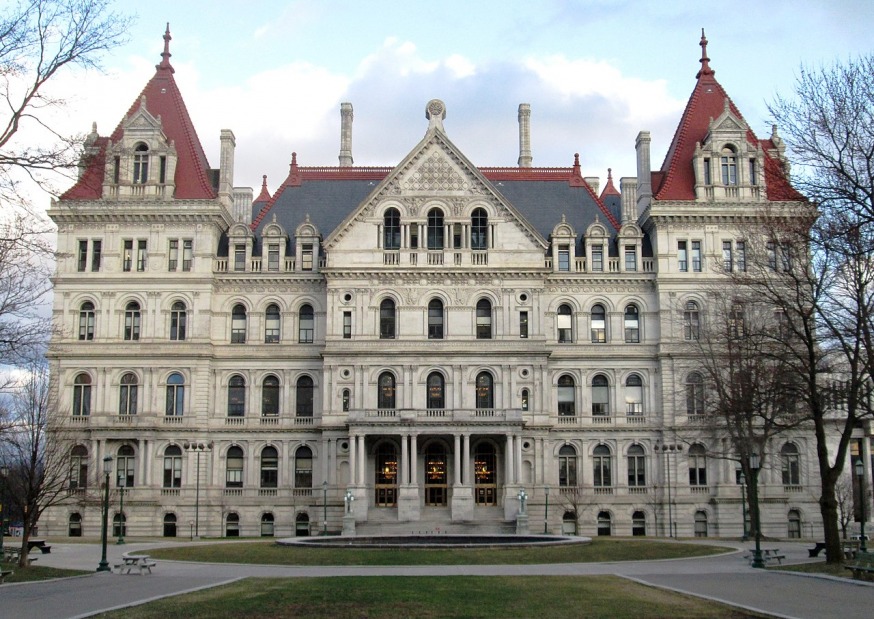
New York State Capitol (Wikimedia Commons)
Feb. 19, 2020 By Kristen Torres
Lawmakers are split on whether or not to back the state’s six-week-old bail reform law, which has ignited fierce debate among elected officials, the police and criminal justice advocates since it went into effect on Jan. 1.
The new law eliminated cash bail for most misdemeanor and non-violent offenses, giving judges no choice but to let offenders go while they await trial on an array of non-violent charges. Such charges include stalking, burglary, many drug offenses and certain robberies.
However, after several high-profile incidents of people being released under the new reforms—and then re-offending soon after—many want the law to be reviewed.
Andrea Stewart-Cousins, the senate majority leader, is one of them and told Newsday that law is being re-evaluated.
Stewart-Cousins said that she is working on a new proposal that would eliminate cash bail on all crimes but would give judges discretion to remand people who have been charged with an expanded list of violent felonies and misdemeanors.
The proposal would give judges judicial discretion on whether or not to hold suspects based on their criminal history as well as the risk of them not showing up to trial.
“We would give judges some discretion but with extremely strict guidelines and guardrails,” Steward-Cousins said in a statement.
The goal of making sure that someone doesn’t sit in jail because they can’t afford to pay bail would be preserved.
“Simply put, the reforms will ensure that no one will be incarcerated simply because of their inability to pay and that no one will be let out of prison because of their enormous wealth,” Stewart-Cousins said in a statement.
Stewart-Cousins has yet to disclose any revised legislation.
Bail reform has been heralded as a necessary measure to combat the racial injustice of the state’s criminal justice system, but has also become one of the more divisive topics among elected officials in recent weeks.
Assembly Member Catalina Cruz, who represents Elmhurst, Corona and Jackson Heights, remains a staunch supporter of the bail reform law.
She said the legislation took “years to finalize” and is pushing her colleagues to wait off on rolling back reform measures just yet.
“For a very long time we were criminalizing poverty, and now we have something in place that creates a more equitable system,” Cruz said.
Cruz also said it is too early to determine the effectiveness of the bail reform law.
“If they [opponents] come in six months and show evidence otherwise, then I’ll think about reconsidering,” Cruz said. “But the only evidence I see right now is racism and playing politics with peoples lives.”
Assembly Speaker Carl Heastie, like Cruz, has made it clear that he too doesn’t want the reforms rolled back.
State Senator Jessica Ramos tweeted in support of the reforms last week, writing that bail reform lets people “access support services” and “remain home with family.”
However, Ramos would not comment on Stewart-Cousins’ proposal.
State Senator Joseph Addabbo, however, said he is willing to consider the new proposals, and said legislation oftentimes has to be monitored and reworked. He said his constituents are specifically concerned with recidivism rates among offenders.
“Many times we do legislation with good intentions, and you have to sit back and monitor the effects to determine what changes need to be made,” he said.
“But I believe my leaders are on the right track to try and work out a credible, realistic solution to bail reform,” he added.
State Senator Michael Gianaris, who sponsored the bail reform legislation, did not immediately respond to a request for comment.
The progressive caucus of the New York City Council—which includes Queens Council Members Jimmy Van Bramer, Donovan Richards, I. Daneek Miller and Antonio Reynoso—penned a letter of support on Feb. 15 for the current reforms, arguing the policies are necessary to end mass incarceration. They urge state lawmakers not to make changes.
“These laws were designed to create a fairer system by ensuring that innocent people are no longer deprived of their freedom simply due to the size of their bank account and the color of their skin,” the letter said.
The letter also said the state should be finding more ways to invest in social services that help people stay out of jail, including mental health facilities, schools, pretrial services and housing.
Critics of the reform, however, said the new legislation is “dangerous.”
George Grasso, the supervising judge of Bronx Criminal Court, has been a dissenting voice to the reforms, and said the need for “judicial discretion” is paramount for the criminal justice system.
“New York does not let judges consider ‘dangerousness’ but instead resorts to twisted logic,” he said in a statement. “We should stop the charade now—judges should be trusted to consider dangerousness and public safety in appropriate cases.”
NYPD Commissioner Dermot Shea has criticized the reforms, arguing that the recent crime spike can be attributed to the new law. He wants judges to have greater discretion to keep career criminals behind bars while awaiting trial.
Shea has been in Albany talking to legislators.
However, Councilmembers Donovan Richards and Rory Lancman argue that Shea is fearmongering.
They sent him a joint letter earlier this month saying that he is painting a “false narrative” and that statistics indicate that bail reform is not responsible for the uptick in crime.
One Comment

The reform allows criminals to commit more crimes.
Reform the Reform.